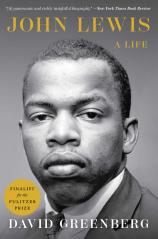John Lewis: A Life
Review
John Lewis: A Life
Born in Alabama in 1940, John Robert Lewis was descended from a line of slaves and sharecroppers. Despite the abolishment of slavery 75 years before, the plight of the African-American men and women continued in the Deep South. Lewis was determined from an early age not to live in the poverty-stricken backwaters of the South. He was well-read and particularly enjoyed reading the Bible. While his family toiled the land to make ends meet, Lewis would be more inclined to have his face buried in a book and acquire whatever knowledge he could.
The Civil Rights movement had begun in earnest as Lewis left home to attend seminary school in Nashville. Despite Nashville being considered a more progressive-minded city than its Southern neighbors, there were still certain facilities (such as lunch counters and stores) that clung to the restrictive practice of segregation. Lewis would become involved with the Nashville Christian Leadership Council, where the utilization of sit-ins and other methods of nonviolent resistance would help publicize the push for desegregation of the targeted locales. For his work, he would take his lumps, along with the occasional arrest and resulting stint in jail.
"David Greenberg has written a comprehensive and moving account of the life and times of a trailblazer in the Civil Rights movement and a persistent advocate for change."
By the 1960s, Lewis was becoming a known presence in the various integration campaigns. He was a leader in the Student Nonviolent Coordinating Committee (SNCC) and participated in the Freedom Rides, which attempted to integrate the bus companies operating down South. Lewis and his associates would be met with merciless attacks at the hands of violent mobs, but the backlash didn’t deter his spirit. The violence meted out by racist citizens and law enforcement shocked the conscience of the nation.
Lewis, Martin Luther King Jr. and others knew they were making strides for progress but understood that change needed to come through Washington, DC. They would stress the need for sweeping civil rights legislation to John F. Kennedy and his successor, Lyndon B. Johnson. Protecting the African-American vote would emerge as a paramount concern, especially after a fateful march in Selma, Alabama, in 1965. The Voting Rights Act was the direct result.
Lewis didn’t relinquish his desire to fight the good fight when his time ended with the SNCC. His powerful voice and impeccable character led to his being asked to serve on a committee for President Jimmy Carter. The political bug resulted in him running for Atlanta City Council and would push him to run for Congress in 1986. He served with distinction for over 30 years.
John Lewis was born into a world where he refused to accept the way things were. Throughout the balance of his 80 years, he spoke out for the underdog. He possessed the heart of a lion, the mind of a precocious pupil and the sonorous voice of a revivalist preacher. Lewis was a remarkable man who was knocked down physically but never spiritually in the most trying of times.
With JOHN LEWIS: A Life, David Greenberg has written a comprehensive and moving account of the life and times of a trailblazer in the Civil Rights movement and a persistent advocate for change. This is an important biography of an icon and a force of nature in politics and history that should be on everyone’s reading list.
Reviewed by Philip Zozzaro on October 18, 2024
John Lewis: A Life
- Publication Date: October 7, 2025
- Genres: Biography, History, Nonfiction
- Paperback: 704 pages
- Publisher: Simon & Schuster
- ISBN-10: 1982143002
- ISBN-13: 9781982143008




